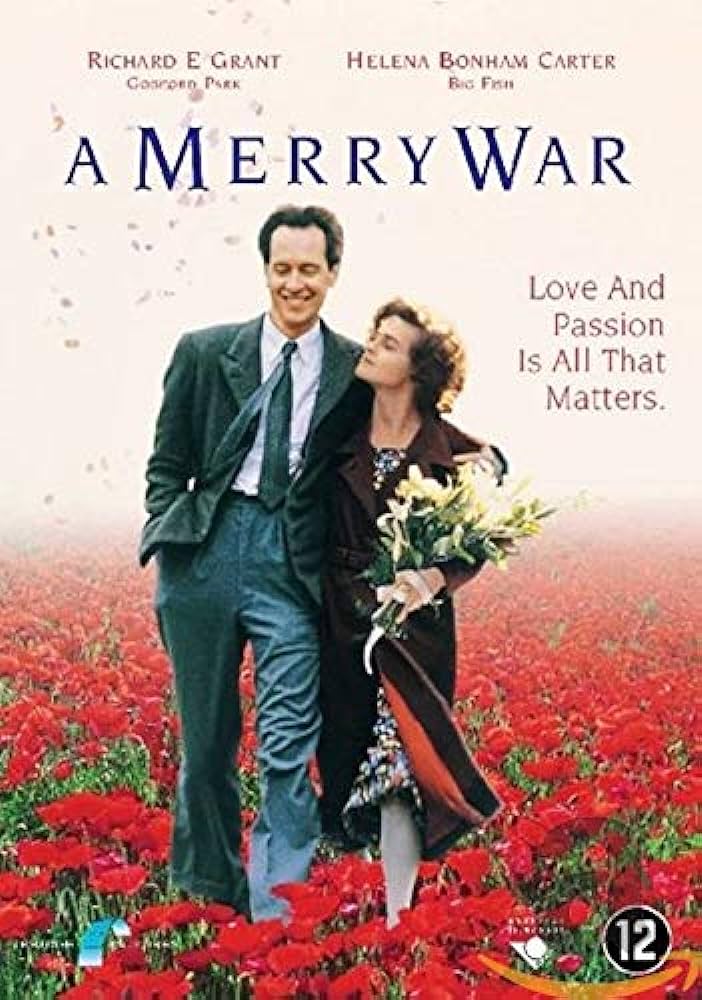"Hooray for Satire Reborn!"

| None | Light | Moderate | Heavy | |
|---|---|---|---|---|
| Language | ||||
| Violence | ||||
| Sex | ||||
| Nudity |
What You Need To Know:
A MERRY WAR is a merry, but ironic, English satire based on a 1936 novel by George Orwell, author of ANIMAL FARM and 1984. The movie tells the story of an advertising copywriter in London, who gives up his well-paying, successful job to pursue a career as a poet. The angry young idealist worries his girlfriend and his rich publisher when a twist of circumstances leads him to take a low-paying job and a filthy room in one of the poorest sections of town. Richard E. Grant stars as the would-be poet, Comstock. Helena Bonham Carter is his girlfriend, Rosemary. Julian Wadham plays the rich publisher.
Comstock’s gloomy, acerbic personality in the first half of the movie may turn off many viewers, but the other characters and some lighthearted moments help pass the time until circumstances spark positive changes in his character. The movie also has a happy, morally satisfying ending that validates marriage, family and the middle-class lifestyle, a lifestyle that is essential to running a godly, orderly and just society. There is also an anti-abortion subtext in A MERRY WAR. On the down side, however, this movie contains some foul language and implied sexual immorality that is not rebuked
Content:
(Ro, B, LL, V, S, N, AA, D, Co, AC, ACap, Cap, Ab, C, M) Mixed worldview that combines a romanticist worldview of man’s essential “goodness” with positive moral elements, especially in the movie’s happy ending, & several pleas for God’s help; 15 obscenities, 3 profanities, 4 British profanities, & several vulgarities & sexual innuendoes; men fight in street & woman slaps man; two discreet scenes of implied fornication, one scene of preparing for fornication, prostitutes appear briefly in one street scene, & man looks at biological sketch in book of unborn child in a womb; implied nudity in bed & in bathtub & women in underwear in two or three scenes; alcohol use & one episode of drunkenness; smoking; implied Communism of characters, but movie’s ending has anti-Communist subtext; main character speaks out against upper classes & “the money god,” but in the end validates middle class lifestyle of earning money to support one’s family; magazine in background is titled “Anti-Christ” & clergy are lightly mocked in one scene, but main character briefly pleas for God’s help & sees poster as a sign from God; and, miscellaneous immorality such as breaking one’s promise to a family member.
More Detail:
A MERRY WAR is a merry, but ironic, English satire based on a 1936 novel by George Orwell, author of ANIMAL FARM and 1984. The movie tells the story of an advertising copywriter in London, who gives up his well-paying, successful job to pursue a career as a poet. The angry young idealist worries his girlfriend and his rich publisher when a twist of circumstances leads him to take a low-paying job and a filthy room in one of the poorest sections of town. Richard E. Grant stars as the would-be poet, Comstock. Helena Bonham Carter is his girlfriend, Rosemary. Julian Wadham plays the rich publisher.
Comstock’s gloomy, acerbic personality in the first half of the movie may turn off many viewers, but the other characters and some lighthearted moments help pass the time until circumstances spark positive changes in his character. The movie also has a happy, morally satisfying ending that validates marriage, family and the middle-class lifestyle, a lifestyle that is essential to running a godly, orderly and just society. There is also an anti-abortion subtext in A MERRY WAR. On the down side, however, this movie contains some foul language and implied sexual immorality that is not rebuked.



 - Content:
- Content: 
